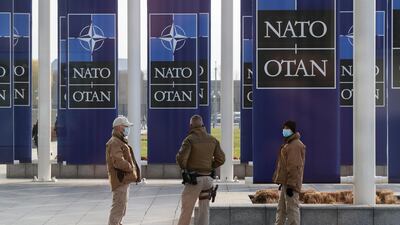Nato foreign ministers met in Brussels on Tuesday for a summit on reforming the alliance, where US Secretary of State Tony Blinken assured allies that Turkey would remain in its fold and all members would be consulted on Washington's plans to drawdown from Afghanistan.
Mr Blinken said the alliance can emerge stronger after a period of internal divisions and should keep Turkey at the heart of transatlantic ties.
Despite public differences with Ankara, the US and Nato have a strong interest in keeping Turkey anchored in the alliance.
"Turkey is a long-standing and valued ally," Mr Blinken told a panel event at Nato headquarters, even if it was "no secret" the US and others were opposed to Turkey's actions in the eastern Mediterranean and acquisition of S-400 missiles from Russia.
The chief US diplomat also make consensual comments on President Joe Biden's policy of withdrawing from the two-decade engagement in Afghanistan. "We’ve said, we’ve made a commitment: in together, adapt together, and when the time is right, out together. That remains the guiding principle," he said.
"The other guiding principle is that the reason we were in Afghanistan in the first place is because of the terrorist threat that was emanating from there."
Mr Blinken said the US and Nato were determined to ensure Afghanistan could never again become a safe haven for terrorists.
Nato Secretary General Jens Stoltenberg said no decisions were taken on Tuesday over a possible troop withdrawal. He told a press conference after the meeting that there was "no risk free path" ahead or easy solution.
European allies have welcomed the change in tone from the US, saying they are once again being consulted on strategy.
"The last thing we can afford to do is take this alliance for granted," said Mr Blinken, who is in charge of reversing former president Donald Trump's 'America First' foreign policy.
Having already bought Russian weapons, Turkey briefly blocked Nato defence plans in 2019 and launched an offensive on US-backed rebels in Syria, prompting French President Emmanuel Macron to assert that Nato was "experiencing brain death".
Mr Stoltenberg has set out areas where the alliance could modernise its focus – from climate measures to more sustainable funding of military operations – and stressed the need for US support.
Mr Stoltenberg said there was "no way to hide that over the last few years we had some difficult discussions within our alliance, and we have seen some differences".
Mr Blinken said he would raise with his German counterpart Heiko Maas Germany's push to complete construction of a controversial gas pipeline under the Baltic Sea from Russia, which remained a divisive issue. Nord Stream 2 ran counter to the European Union's interests and could undermine Ukraine, Mr Blinken said.
"President Biden has been very clear, he believes the pipeline is a bad idea, bad for Europe, bad for the US, ultimately it is in contradiction to the EU's own security goals," he said.
"It has the potential to undermine the interests of Ukraine, Poland and a number of close partners and allies."








